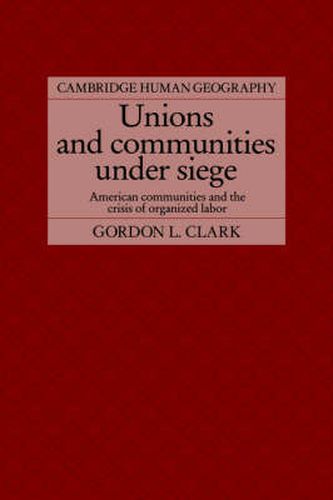Readings Newsletter
Become a Readings Member to make your shopping experience even easier.
Sign in or sign up for free!
You’re not far away from qualifying for FREE standard shipping within Australia
You’ve qualified for FREE standard shipping within Australia
The cart is loading…






The essential argument of this book is that the current crisis of US unions ought to be considered in terms of the local context of labor-management relations; that is, the communities in which men and women live and work. Whether by design or necessity, the structure of New Deal national labor legislation has sustained, and maintained, distinctive local labor-management practices. As the economies of American communities (and the world) have become highly interdependent, reflecting the evolution of corporate structure and trade between economies, unions movement can be traced to unions’ dependence upon inter-community solidarity, a fragile democratic ideal which is often overwhelmed by economic imperatives operating at higher scales in other places. Three particular themes or perspectives appear and reappear throughout the book: the role of the community in labor-management relations; the roles of institutions like the National Labor Relations Board and the courts (state and federal) in adjudicating local labor-management disputes; and the significance of economic restructuring for the roles and future of industrial unions. In all parts of the book, these themes appear as major ingredients of the story. For example, the second part of the studies: a plant closing in Allentown (Pennsylvania); and an arbitrator’s adjudication of a dispute involving the United Auto Workers and the American Motors Corporation over an economic restructuring package which required job rationing between communities on the basis of corporate seniority. While some chapters tend to focus upon one theme, reference is always made to the other themes. An important objective of Professor Clark in this work is to demonstrate the significance of the intersection between communities, unions, and institutions, in understanding the prospects for American unionism.
$9.00 standard shipping within Australia
FREE standard shipping within Australia for orders over $100.00
Express & International shipping calculated at checkout
The essential argument of this book is that the current crisis of US unions ought to be considered in terms of the local context of labor-management relations; that is, the communities in which men and women live and work. Whether by design or necessity, the structure of New Deal national labor legislation has sustained, and maintained, distinctive local labor-management practices. As the economies of American communities (and the world) have become highly interdependent, reflecting the evolution of corporate structure and trade between economies, unions movement can be traced to unions’ dependence upon inter-community solidarity, a fragile democratic ideal which is often overwhelmed by economic imperatives operating at higher scales in other places. Three particular themes or perspectives appear and reappear throughout the book: the role of the community in labor-management relations; the roles of institutions like the National Labor Relations Board and the courts (state and federal) in adjudicating local labor-management disputes; and the significance of economic restructuring for the roles and future of industrial unions. In all parts of the book, these themes appear as major ingredients of the story. For example, the second part of the studies: a plant closing in Allentown (Pennsylvania); and an arbitrator’s adjudication of a dispute involving the United Auto Workers and the American Motors Corporation over an economic restructuring package which required job rationing between communities on the basis of corporate seniority. While some chapters tend to focus upon one theme, reference is always made to the other themes. An important objective of Professor Clark in this work is to demonstrate the significance of the intersection between communities, unions, and institutions, in understanding the prospects for American unionism.